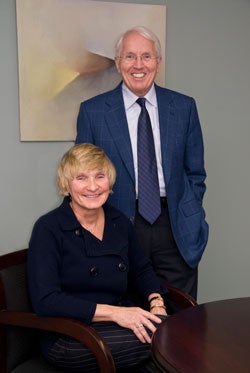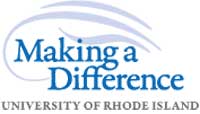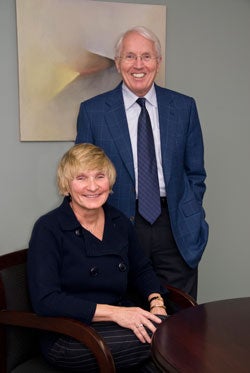 KINGSTON, R.I. –March 18, 2008—James and Janice Prochaska have spent their careers helping people change. However, there is one area where the couple is resistant to change. Both want to see the University of Rhode Island’s Cancer Prevention Research Center, which Jim directs, maintain its stellar programming under strong leadership in the future.
KINGSTON, R.I. –March 18, 2008—James and Janice Prochaska have spent their careers helping people change. However, there is one area where the couple is resistant to change. Both want to see the University of Rhode Island’s Cancer Prevention Research Center, which Jim directs, maintain its stellar programming under strong leadership in the future.
To make sure that happens, the Prochaskas have pledged $250,000 to URI’s Making A Difference campaign to establish the Prochaska Cancer Prevention Research Center Leadership Endowment. Additionally, the couple’s gift is a challenge grant, which means they will match other donations to the endowment dollar-for-dollar.
Robert Beagle, vice president for advancement who worked with the Prochaskas on their endowment notes that such gifts from faculty and friends can set the stage for more campus community support. “Jim and Jan are highly regarded well -liked professionals,” says Beagle. “Others will see the commitment and the affection that the Prochaskas have for URI and will be motivated to give. Private support for renowned areas like our behavior change programming is essential.”
Glen Kerkian, president of the URI Foundation, which manages the university’s fundraising activities and investments, adds: “Gifts like this one, and in particular, the commitment and devotion the Prochaskas have demonstrated, reflect the high value alumni, faculty and friends alike have placed on supporting the university and maintaining and enhancing its competitive edge. The generosity of this couple will most definitely secure positive long-term results for both the Cancer Prevention Research Center and the university at large.”
The primary purpose of the endowment is to help the University attract a nationally recognized director for the Center when Jim steps down and to provide support for graduate students who study and work in the Center. Many of those students have gone on to make major contributions to enhance health.
Jim, a professor of clinical and health psychology, is one of the world’s most respected health psychologists who developed a revolutionary stage model of behavior change at URI called the Transtheoretical Model of Behavior Change. The model has been applied to more than 50 behaviors and is the most cited model in health behavior change.
Major causes of diseases such as cancer, diabetes, and heart disease result from behaviors like smoking, sedentary lifestyles, unhealthy diets, substance abuse, and stress. In fact, diseases resulting from these behaviors account for more than 60 percent of health care costs.
URI’s model –developed from more than 30 years of research, more than $70 million of funded grants, and more than 120,000 participants — understands that change is not an event, but a process. The five-stage model –precontemplation, contemplation, preparation, action, and maintenance–targets each person’s stage and then guides him or her through the stages of change.
When asked if he planned to retire, Jim responded with a smile: “I’m in the precontemplation stage.” Precontemplation is the stage in which people are not intending to take action in the foreseeable future. “That doesn’t mean I’m not ready to turn over leadership of the CPRC to a younger person.”
Jim was the first psychologist to win a Medal of Honor for Clinical Research from the American Cancer Society. He is a recipient of an Innovator’s Award from the Robert Wood Johnson Foundation, and was named one of the Top Five Most Cited Authors in Psychology from the American Psychological Society.
Jan Prochaska is president and CEO of Pro-Change Behavior Systems, Inc., an 11-year-old privately held research and product development company located on campus. Pro-Change expands the stage change model by developing and delivering innovative programs for dissemination partners. Pro-Change has developed numerous programs including domestic violence prevention, stress management, weight management, medication adherence, becoming a proactive health consumer, readiness for adoption, bullying prevention, obesity prevention, and organizational change. The company employs 20 staff members of which seven are doctoral level psychologists and two are doctoral candidates. All but one of the Ph.D’s are or will be URI graduates.
Other higher education institutions, especially Ivy League schools, have tried to lure Prochaska with generous offers. He has refused them all.
“I’ve always believed in public education,” he says. “Both Jan and I were the first in our families to go to college. Our fathers worked in factories.”
The couple met in the band room of Fordson High School in Dearborn, Mich. He was a football player, she a majorette. They have two children; one is an astrophysicist and the other a clinical health psychologist.
The couple visited URI before Jim joined URI’s Psychology Department. “Just like with Jan, it was love at first sight,” Jim says. “The University is small enough to be appreciated and big enough to have wonderful collaborators. And the University has always encouraged entrepreneurship.”
 URI’s Making A Difference Campaign seeks $100 million to recruit and retain outstanding faculty, enhance the student-centered campus experience, provide undergraduate scholarships and graduate fellowships, and fund cutting-edge academic and research initiatives. Anyone wishing to respond to the Prochaska challenge should contact Tom Zorabedian, associate dean, College of Arts and Sciences, at 401-874-2853 or zman@foundation.uri.edu. For more information on the campaign, click www.urifoundation.org.
URI’s Making A Difference Campaign seeks $100 million to recruit and retain outstanding faculty, enhance the student-centered campus experience, provide undergraduate scholarships and graduate fellowships, and fund cutting-edge academic and research initiatives. Anyone wishing to respond to the Prochaska challenge should contact Tom Zorabedian, associate dean, College of Arts and Sciences, at 401-874-2853 or zman@foundation.uri.edu. For more information on the campaign, click www.urifoundation.org.

